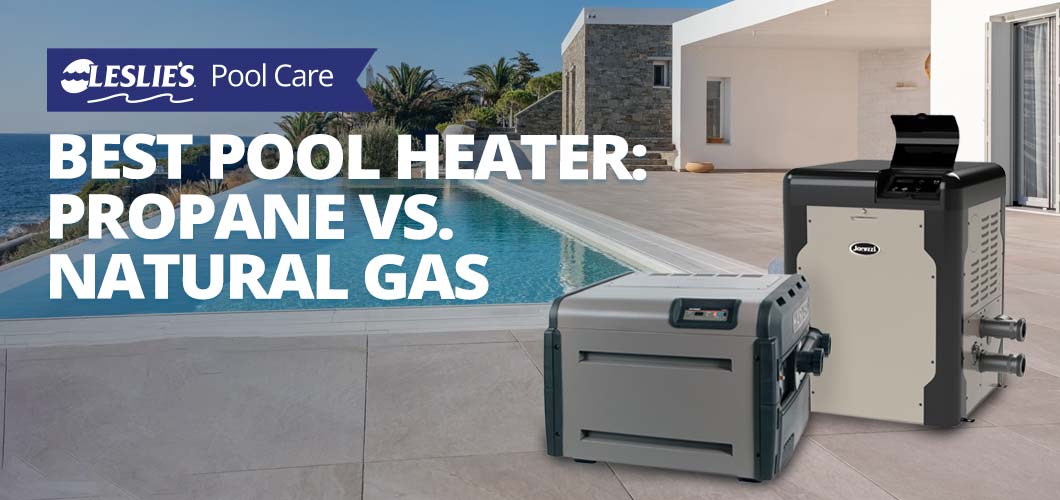
Best Pool Heater: Propane vs. Natural Gas
Investing in a pool heater is a great way to extend swim season, and guarantee your pool is the perfect temperature no matter how cold it is outside. Propane and natural gas pool heaters are two of the most common types of heaters, and do a stellar job of keeping your pool toasty. But is one better than the other? In this post, we highlight the pros and cons of propane vs. natural gas, and determine if one wins the title of best pool heater.
Propane Pool Heaters
First up in our comparison are propane pool heaters. Powered by — you guessed it — liquid propane, these heaters are powerful and efficient machines. The cost of a propane heater ranges from $1,500 for a 150K BTU (British Thermal Unit) unit, up to $5,000 for a larger 400K unit.
Pros
- Fuel Efficient. Propane is a very energy-rich source of fuel, so your heater won't need to use much to warm your pool. A cubic foot of propane can produce about 2,516 BTUs, which means roughly 40 cubic feet of propane produces 100,000 BTUs.
- Environmentally Friendly. Propane is considered a "green fuel", which means it is a clean source of energy and has little to no negative effect on the environment.
- Works in Cold Weather. One of the biggest draws of propane and natural gas pool heaters is that they work just fine regardless of the outside temperature. Unlike solar heaters or electric heaters that require temps above 50ºF–60ºF, gas heaters don't require a minimum outside temperature to function properly.
Cons
- Gas Price. At the time this post was written, propane costs approximately $3 per gallon. A 300K BTU heater will use roughly 3 gallons of propane each hour to warm a standard 15,000–20,000 gallon pool 2–3ºF per hour. So on average, a 300K BTU propane heater will cost around $6.00 per hour to heat your pool.
- Propane Tank Refill. Propane pool heaters require a standalone propane tank to operate, which means the tank has to be refilled whenever it empties. A standard-size pool (15,000–20,000) typically needs a propane heater with at least 300k-400K BTUs, and to power that size heater, you will need roughly a 200–250 gallon tank of propane. A 200–250 gallon propane tank costs approximately $350–$700, depending on where you live.
Natural Gas Pool Heaters
Unlike propane heaters, natural gas pool heaters hook directly to your home's natural gas line. This provides the heater with a nearly endless supply of fuel, and eliminates the need to refill a gas tank. Natural gas heaters in the 150K–250K range run $1,500–$3,500, while those with higher BTUs cost upwards of $4,500.
Pros
- Gas Accessibility. If your home has a natural gas line, hooking up your heater is quick and easy. This direct line allows you to access as much fuel as you need to keep your pool at the desired temperature. And you never have to worry about refilling your tank!
- Gas Price. Depending on where you live, natural gas can be significantly cheaper than propane. At the time this post was written, natural gas cost approximately $10 per 1,000 cubic feet. One cubic foot of natural gas holds 1,037 BTUs. So if you have a 200K BTU pool heater
- Works in Cold Weather. Just like propane heaters, natural gas pool heaters can function in any outside temperature, which makes them perfect for areas that get especially cold!
Cons
- Less Fuel-Efficient. Natural gas burns at over twice the rate of propane. A cubic foot of natural gas produces only about 1,037 BTUs, where propane generates 2,516 BTUs. Because of natural gas's reduced fuel efficiency, you'll use more of it to heat your pool adequately.
- Gas Accessibility. While natural gas is easily accessible for folks who already have a line on their property, it can be a big expense for people who don't. Installing a natural gas line and meter is a pricey project, often costing upwards of $2,000 depending on your location. This can put quite a dent in the budget, as the heaters alone cost between $1,500 and $4,500.
- Environmental Concern. Unlike earth-friendly propane, natural gas, which is mainly methane, is considered a greenhouse gas. This means natural gas is toxic, and a leak could cause serious damage to people and the environment. While a natural gas leak is relatively rare, it is something to consider when selecting a pool heater.
Final Thoughts

So the question remains in the propane vs. natural gas pool heater debate — which one is the best pool heater? Well, that answer depends on a few factors, like your budget and your heating needs. Propane gas is more expensive than natural gas, but it is also more fuel efficient. So while it costs more upfront, it will last longer than natural gas. If you have a natural gas line on your property, the fuel is readily available and will never run out. But if you don't have a natural gas line, installing one is expensive and time consuming.
At the end of the day, the best pool heater is simply the one you think fits you and your pool best! Natural gas and propane heaters are excellent machines, and will undoubtedly keep your pool nice and toasty. And remember, your local Leslie's is always here to help with any pool or pool equipment needs.